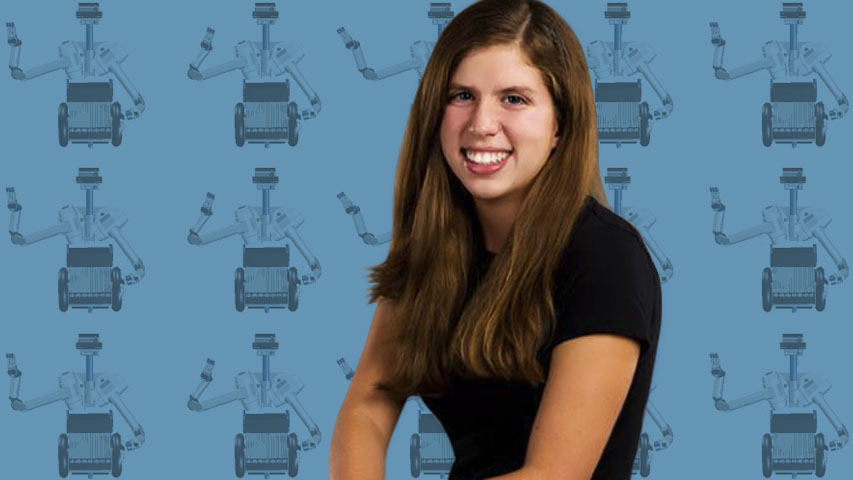Holladay Earns National Recognition for Robotics Research
By Susie Cribbs

Rachel Holladay built a mapping website for the U.S. Department of the Navy and was a longtime veteran of the FIRST Robotics program, all before arriving at Carnegie Mellon University in 2013.
Since then, she's conducted robotics research and has been a leader in the School of Computer Science's Women @ SCS and SCS4All outreach organizations while carrying full courseloads.
It's no surprise that the rising computer science senior and Slidell, La., native earned the 2016 Collegiate Award from the National Center for Women & IT (NCWIT).
Sponsored by Hewlett Packard Enterprise and Qualcomm, the award honors the outstanding technical accomplishments of college women. The award recognizes women's technical contributions to projects that demonstrate a high level of creativity and potential societal impact. Winners receive $10,000, a trophy and a trip to the NCWIT Summit in Women and IT - held this past May in Las Vegas.
Holladay, who also earned the national NCWIT Aspirations in Computing Award for high school woman in 2011, received the honor for her work on "Robot Gesture Engine (RoGuE)," which she completed in the Personal Robotics Lab in CMU's Robotics Institute. Working with Finmeccanica Associate Professor in Computer Science Siddhartha Srinivasa, Holladay developed a library of gestures that improve robot communication and partnership skills in human environments and collaborative settings. While the gestures function on several robots, Holladay worked primarily with the lab's Home Exploring Robot Butler — HERB.
She began working in the Personal Robotics Lab as a first-year student.
"I wanted to do robotics when I came to Carnegie Mellon, and I jokingly say that I came here for the Robotics Institute," she said. "Associate Teaching Professor and Assistant Dean for Undergraduate Education Tom Cortina sends students emails about research opportunities. At the very bottom of one email was one about robots. It listed a set of skills, and I had fewer qualifications than they asked for. You could quantitatively measure that I was not qualified. Logically, I applied anyway. Because what's the worst that could happen?"
Holladay didn't get the job, but a few weeks later she was offered a position in the lab. She's worked there ever since.
She started studying deceptive robotics: how robots can deceive through their motion. Then she moved on to work in gestures and studied controls for assistive robotics. Now her research centers on how to use machine learning to allow robots to learn from humans.
"Imagine if a computer is trying to learn how you liked your cookies, for example, and they asked you a bunch of comparison questions," she said. "It's very easy for you to answer, and the computer can learn your preferences based on that."
She presented a paper based on the work at the Robotics: Science and Systems conference, held June 18-22, at the University of Michigan.
As she enters her senior year, Holladay plans to continue her work in the Personal Robotics Lab and will focus on developing algorithms to allow robots to follow arbitrary paths in space.
"The hope is that if you can easily specify these paths, you can get a robot to follow directions like 'Oh, just pull it down,' and to expand their skill sets by building this new motion planner," she said.
Between research and classes, Holladay leads professional development activities for CMU's Women @ SCS organization and academic development activities for SCS4ALL, which aims to build a more inclusive environment in SCS. She mentors the Girls of Steel, the FIRST Robotics team sponsored by CMU.
Research is in her blood. Her father teaches mathematics at the University of New Orleans, and her mother is an electrical engineer for NASA. Her own future has yet to be determined.
"It's been a dream and goal of mine for a long time to earn a Ph.D., and I really like doing research," she said. "I think it makes sense that if you're happy with something, you should keep doing it."